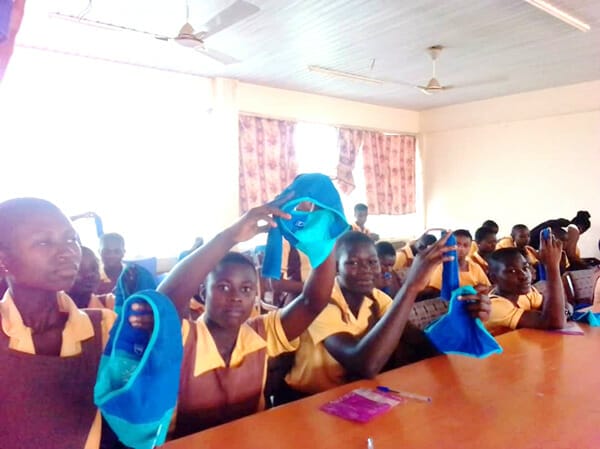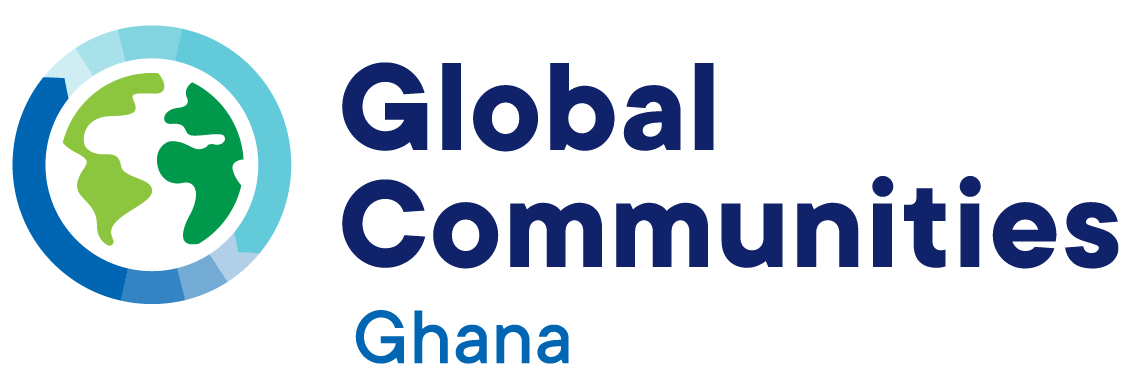News > Blog
Holistic Menstrual Hygiene Management in Ghana
Published 12/21/2022 by aadams

For a visually or hearing impaired girl in a deprived community, menstruation is not just the monthly flow of blood. It is a burden of understanding why she has to bleed, communicating her discomfort associated with the bleeding, accessing user-friendly and hygienic sanitary materials, and determining when next ‘Miss Red’ will rear her head. Girls without these physical challenges encounter similar constraints in addition to stigma from their male compatriots. Some parents, the primary caregivers of these adolescents continue to transfer misconceptions on menstruation.

All these have been factored in Global Communities’ all-inclusive and holistic approach to Menstrual Hygiene Management (MHM) interventions in Ghana.
MHM Interventions
In January 2020, over three hundred basic students in the Central Region, including visually and hearing impaired females, benefitted from MHM education and products. These beneficiary were adolescent girls, boys, their parents and teachers of the Cape-Coast School for the Blind and Deaf and Ayifua St. Mary’s Anglican Basic schools. These interventions were undertaken as part of the USAID-funded WASH for Health project – Caterpillar Partnership implemented by Global Communities.
The MHM team from Global Communities with assistance from the Ghana Education Service (GES) organized a day session each, for the two schools. The education for the girls span from reproductive health through to the management of menstrual discomfort. Proper dieting during menstruation was not left out. They were advised on taking more iron-based foods to replenish the blood discharged. The boys were educated on MHM to support the girls instead of stigmatizing them.

The students received Be Girl PeriodPanties and SmartCycle, designed by an American-Based company. The Be Girl PeriodPanties are re-usable panties with absorbent towels to absorb the flow. The Be Girl SmartCycle is an easy-to-use cyclical device for tracking menstrual flow.
The students were excited about the products since most of them could not afford sanitary pads every month. Most of them were unable to track their menstrual cycle, leading to blood stains on their uniforms. The holistic MHM intervention boosted the confidence of the girls present and positively influenced the perception of their male counterparts.
MHM at Cape-Coast School for the Blind and Deaf
At the Cape-Coast School for the Blind and Deaf, over one hundred girls with visual and hearing impairment benefitted from the MHM interventions. The education was communicated to the students via sign-language, posters and demonstrations. Each girl received two Be Girl re-useable panties with four re-useable towels and a Be Girl smart cycle for calculating their menstrual cycle. The girls took turns to try their hands on the usage of the panties and the calculation of their cycle with the calendars. They were admonished to be more expressive with their trained teachers about their period. At the end of the session, some of the deaf girls expressed, “No More ‘Ghana Map’ stains on our uniforms,” where Ghana Map means blood stains on their uniforms.
MHM at Ayifua St. Mary’s Anglican School
Menstrual Hygiene education is usually limited to girls, however stigmatization of girls at puberty is championed their male counterparts. A holistic MHM education was organized for boys, girls and their parents at the Ayifua St. Mary’s Anglican school. Over two hundred students and their parents received MHM education.
The girls also received two Be Girl panties with four towels each, and booklets on MHM. The boys also received the booklets. After being enlightened o MHM, they promised to be champions of MHM both in school and at home. A discussion was held with the parents for targeted education on MHM. They left the session enlighten and willing to provide the needed support for their adolescent girls.
Additionally, the school received various educational posters on MHM. The girls were excited about both the intervention and the renewed position of their male comrades. The teachers were also very much appreciative of the complimentary education that the MHM team gave to their pupils.
Both schools were full of praise for USAID and Global Communities’ all-inclusive and holistic approach to MHM interventions. Government and organizations are encouraged to adopt this approach.
MHM during COVID19
During this period of COVID 19 there has been advocacy on various platforms for the provision of menstrual hygiene materials by government, organizations and individuals. Key messages are currently being crafted in collaboration with government agencies, and Pro-MHM organizations, to be disseminated in communities, on mass and new media.
WASH for Health Project and MHM
Under the six-year WASH for Health project, MHM has been promoted in project schools in six out of the nine project regions in Ghana, namely: Savannah, Central, Western, Greater Accra, Volta and Oti Regions. Close to five thousand girls, boys and parents from 35 schools have so far benefitted from the MHM interventions since 2017.
